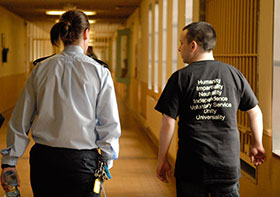Good prison health involves empowering prisoners

IFRC/Ombretta Baggio
"It's given me hope for the future – something I've never had. I can be a good father, parent and member of the community and get a good job. I don't see myself as Eddy the inmate, but as Eddy the Irish Red Cross volunteer".
An Irish Red Cross programme in the Irish prison system over a 6-year period, involving 14 prisons and over 700 volunteers, has shown that empowering prisoners to take charge of their own health can yield impressive results. The programme, known as "Community-based Health and First Aid in Action", operates within a partnership between the Irish Prison Service, Education and Training Boards Ireland and the Irish Red Cross. Groups of selected prisoners are trained as peer educators and do hands-on health promotion among fellow inmates to raise their awareness about community health, personal hygiene, first aid and well-being. This "whole of prison approach" involves staff, the health care system and the prisoners themselves.
The approach is based on simple health awareness initiatives, such as teaching hand-washing techniques to prevent the spread of infection, anti-litter campaigns and a colour-coded mop-and-bucket system. The changes are thought out and taught by fellow inmates, working in groups. The process empowers both the peer teachers and other inmates to practise the new initiatives; the results benefit both prisoners and staff and reduce the prison budget as health improves.
A weapon-free prison
In addition to basic health awareness, the empowered prisoners have addressed issues that persist in many prisons, such as assaults with cutting weapons. Assaults on fellow inmates are common in most prisons. Prisoners access all sorts of weapons, such as sharpened pieces of plastic that can be used as knives (known as "shivs"). As part of the Red Cross programme, inmates in Wheatfield prison decided that they wanted to have a prison free of weapons.
The work of the prisoner volunteers in conjunction with prison management reduced assaults with weapons from 97% to less than 6%, and there was a 50% reduction in assaults overall. The actions used were simple but effective: a weapons amnesty was introduced whereby inmates could give up any weapons they had stored, and the seven principles of the Red Cross (neutrality, universality, humanity, voluntary service, impartiality, unity and independence) were used as a countdown and got inmates talking about the meaning of the terms. A culture of non-violence and peace was promoted, and inmates were taught how to deal with violence, stress, stereotyping and loneliness. Volunteers took responsibility for informing and involving new arrivals in the non-tolerance of weapons.
Reflections from volunteers
Remarks by some of the volunteers testify to the impact of the programme in prison and also when they are released:
- "My experience as a volunteer has taught me that being in a group has helped us to change things like keeping the prison clean." James
- "My experience as a volunteer has taught me I can help others." Wenio
- "Working in a team I have learned that projects can be completed more easily when people pull together." Patrick
- "My experience as a volunteer has taught me that when working with a group of different people, be patient and if you are really into it you can do anything." PJ
Colour-coded mops
One initiative focused on improving hygiene in prisons. The same mops were being used in all areas, which was unhygienic and spread common infections. A system was set up whereby mops were colour coded for use in specific areas, separating the toilet mop from that used in eating or sleeping areas and from those used for blood spills or vomit. Cleaning staff and inmates were instructed, and posters were put up to raise awareness and ensure that all inmates knew which mop to use where.
Anti-litter campaign
As prisoners threw waste from their cell windows, litter was piling up outside each wing. This was attracting vermin and creating odours, especially during the summer months. To prevent this, the administration suggested that the windows be barred with litter shields; however, as the prisoners were not in favour of closing off their windows, the Red Cross team designed and printed posters to convince inmates to stop the practice.
Hand-washing techniques
Prisoners were not aware of the correct way to wash their hands and prevent the spread of influenza and other common infections. The correct procedures were taught to the Red Cross volunteers and, with the aid of a glo box, which simulates germs in a glowing ultraviolet light, the volunteers taught these same procedures to fellow inmates. Posters were put up on the landings to remind prisoners of the importance of hand-washing and the correct way to do it.
WHO Health in Prisons programme
The prison health programme at WHO/Europe supports cooperation between the criminal justice system and the public health system. WHO promotes prison health services that are integrated into national health policies and systems, including the training and professional development of health care staff. Prisoners should be offered training and education during their imprisonment to facilitate their return to society and reduce the risk for reoffending.



